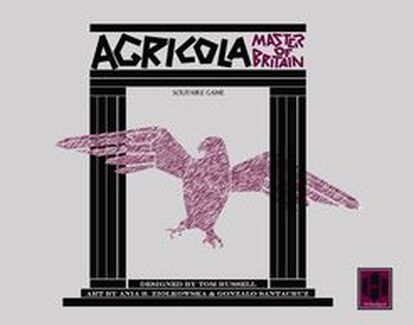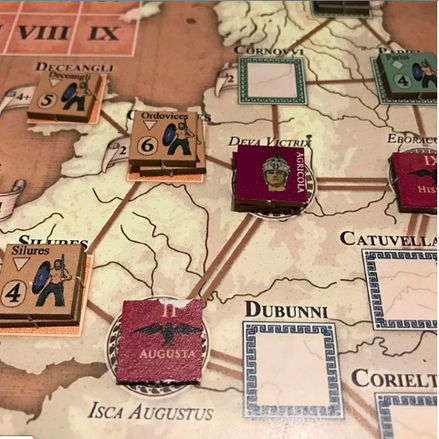 Cover image from BGG Cover image from BGG What is this game about? Agricola, Master of Britain, designed by Tom Russell and published by Hollandspiele, is a game in which you control the Roman legions under Agricola as they attempt to subdue ancient Britain and bring about Romanization and stability. Agricola was an interesting guy living in interesting times—the Emperor Domitian was incompetent but obsessed with staging military victories, and was notably jealous of men like Agricola who had actual capabilities in the field. We also have a notably biased but still interesting biography of Agricola, written by his son-in-law, the Roman historian Tacitus. (Tacitus is a damned good read, especially if you enjoy learning about those wicked, wicked Roman emperors!) Anyway, in Agricola, Master of Britain, you begin in a really tough situation—you are surrounded by hostile tribes, and your armies really could be better and more experienced. The game lasts for eight turns, and can end in your defeat for a number of reasons. If you fail to meet each turn's VP threshold, you lose. Empty treasury? Lose. Lose a battle? Definitely lose. Rome must always win battles! If you fail to deal with the leader Calgacus at the battle of Mons Graupius, and he's still on the board at the end of the game, you will also, you guessed it, lose. To win a game of Agricola, Master of Britain, you need to generate increasingly large amounts of victory points. After turn 1, you only need 3 VP to continue. But by the end of turn 8, you need to have generated 75 or more of them—and in this game, VP are very hard to come by. Each turn, you get 1 point for regions that are empty of hostile tribe markers (good luck), 1 point for each Roman legionary who has been promoted to the highest level (if they don't die in battle), 1 point for each fully-developed settlement (which takes two turns and a lot of money to create), and 1 point for each dead tribal leader in the dead pool (nice if you can kill one early). You can also spend money—of which there isn't much—to purchase VP as you go, and if you can afford to sacrifice actions, you can choose to pass and earn 1 VP for every one foregone. But you'll have a lot of fires to put out! If things go well, you'll end up with several sources of VP that help you out over several turns. But you will feel choked out at the beginning of the game, with no guarantee that things will get better for you. As you're trying to build a viable VP engine out of essentially nothing, you will find yourself challenged by angry British tribes no matter what you do. Shifting loyalties are represented in Agricola, Master of Britain by an interesting chit-pull system, where enemies can be in the "friendly," "unfriendly," or "hostile" cups. While you can occasionally bribe some people into the friendly cup, most things you do make the local population more hostile, moving chits from friendly to unfriendly, and from unfriendly to hostile. You will also end up provoking hostile tribe reactions, which means that you pull chits from the hostile cup and place them on the map. Depending on what you do and how you handle it, it's easy to get overwhelmed. If three chits end up on the same spot, they may engage in internecine warfare—but they're also in open rebellion against you. If you pull a tribal leader from the chit cup, he will unite the people in his region in ways that seriously hamper your own activities. How does it play solo? Agricola, Master of Britain is specifically a solitaire game, so I'd say it solos pretty well!  This game starts with you hemmed in on all sides. This game starts with you hemmed in on all sides. Overall Thoughts Agricola, Master of Britain is a very interesting solo experience, not quite like any others I've had to date. The chit pull system, with tribes shifting between different cups, is fascinating and a fun challenge to manage. And the pressure you feel in the first turns of the game, when you are hoping desperately to create sustainable sources of VP that will see you through eight turns, is intense. I lost early a lot when I was first learning the game, and it can still happen if I get extremely unlucky. Thematically, I'd say that makes sense. The Roman army was powerful, but Julius Caesar himself had a really hard time during his attempted invasion of Britain, and he barely left with his dignity intact. (And he probably only managed that because he wrote the reports himself...) By the time Agricola was governor of Britain, it had been under Roman rule since the emperor Claudius "conquered" it, but we should probably leave that word in quotation marks. The tension in those early turns of Agricola, Master of Britain is almost unbearable, but in a fun way. Once you figure out how to build up VP and keep 'em coming, you get a little more breathing room... but never enough, especially when you have a tight timeline and so much to do! Chit pulls also stay very tense, because you'll constantly have to deal with the threat of bad pulls that can sometimes lead to raids. In most games, Calgacus will appear and you'll have to deal with him in a massive battle from which it can be difficult to recover. In other games, he never emerges at all... but you're still waiting and wondering if he will. Overall, I'd say this is a very good game. But Agricola, Master of Britain has a few issues, for me at least. The main one is the battle system. After all of that careful planning and building, you can still get absolutely screwed by some bad die rolls, especially at the massive battle of Mons Graupius, Luck in games doesn't normally bug me too much, but I get tetchy about it when I've been putting so much effort into planning and puzzle-solving, only to have it all go up in smoke. (In fairness, many Roman generals probably had this feeling, too, but with actual weapons involved.) What makes this more difficult is that the battle system does not allow for the same level of planning as the rest of the game—you essentially line up the soldiers on both sides, then roll a die repeatedly for each of your units' attack and defense turns until one side is entirely defeated. In larger battles, that is a lot of die rolling, and while the attack and defense values of your units can help to mitigate your rolls, there is nothing else you can do to influence the outcome. In my opinion, this is the clunkiest aspect of an otherwise tight design. The other feature of gameplay that I personally find frustrating is that there are serious limitations on movement. You can't move more than one adjacent space at a time, and you can't even do that without pairing your movement with an action. This means that if you suddenly end up out on your own, without an enemy right next to you to fight and without any more settlements to build, you can end up kind of stuck. The only solution is to spam peacekeeping actions—which can lead to a general decrease in hostility, but which can't be carried out in regions with a tribal leader present—to get your legion where it needs to go. For this reason, I highly recommend you always leave a legion near the camps and able to summon reinforcements, because otherwise it's going to be a royal pain to move back there to do it. I know Tom Russell had his reasons for building the game this way (he is very active on BGG!), but this aspect of the gameplay drove me crazy in a bad way. What is a Roman legion without its famed double-time movement? Obviously, I find Agricola, Master of Britain very engaging and have spent a lot of time thinking about it. Why else would I be writing so much? But I will say that I think it has a limited lifespan. The frustration of your initial plays and the satisfaction of learning how to puzzle your way most efficiently through game turns is the most powerful when you are still new to the game and figuring it out. Now, after multiple plays, I've gotten to the point where I am trying to do generally the same things every time I play, albeit with a slightly different board state. Once you've figured out roughly what you need to achieve, and on what timeline, Agricola, Master of Britain isn't as replayable as it was during that initial rush of discovery. That said, I definitely got my money's worth—this game was only $30.00, and I have gotten more play out of it than out of many games at much higher price points. I will probably leave it on my shelf for a while, then discover it anew once I've cooled off for a bit. Either that, or I'll pick up Charlemagne, Master of Europe, which is based on this system but apparently more refined. Do I recommend it? If you're looking for a challenging solitaire game with an interesting historical theme, then yes. Agricola, Master of Britain is a great buy and a fascinating solo gaming experience. Overall Rating: 3.5 stars 5 stars — I love it! 4 stars — I really like it. 3 stars — I like it. 2 stars — It's okay. 1 star — Meh. Enjoy this review? Want to support my site? Buy me a coffee here!
0 Comments
Your comment will be posted after it is approved.
Leave a Reply. |
AuthorMy name is Liz Davidson, and I play solo board games. A lot of solo board games... Archives
August 2021
Categories
All
|
 RSS Feed
RSS Feed